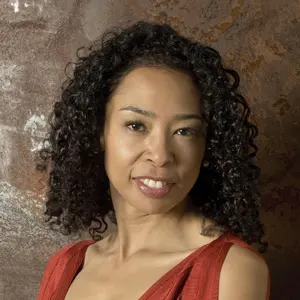Musical Conversation: New Commissions and Beloved Piano Quartets with Nokuthula Ngwenyama

Get to know Nokuthula Ngwenyama—learn about her perspective on being a musical athlete, next week’s program (including her premiere of Elegy) and musical collaborators, as well as what’s up next for this extraordinary and inspirational chamber music violist and composer.
Watch Now!
Program
Click on any piece of music below to learn more about it.
- NOKUTHULA NGWENYAMA “Elegy” (2022)
Nokuthula Ngwenyama Elegy for Piano Quartet (2022)
(b.1976)To remember,
to let go.
To be haunted
then free.Honoring our ancestors
and the sacrifices
leading to this moment,
We commemorate a
will to thrive over centuries
And give respect to
the struggle
which proudly belongs to us all.Elegy is a 12-minute work mourning the souls lost to systemic racism. Rather than suffering in unsatisfying despair, it aims to honor human triumph through recognition of our painful history while commemorating how far we have come in this collective societal struggle.
A questioning melody slowly unfolds by the violin in the 5/4 adagio. The strings build to wailing before being sent on the Middle Passage. The ship rises and falls with flowing eighth notes in the piano, while the sound of rubbing ropes is played on the back of the viola by rolling the stick over loosened bow hair. A sailor whistles while the cello mourns being caught in an inescapable fate. Patterns symbolizing heroes and martyrs are introduced in the piano through call and response and developed in flowing tribute by the ensemble. The cello then states important dates, starting with 1863 in G minor (G G E-flat B-flat) gliding forward through time. A chorus of strings responds in lightness, progress and innovation while the bass line falls and stalls via tremolo on a low D-flat. Clavé rhythms permeate the texture with taps of the string trio in drum-circle fashion, honoring and calling to our ancestors. The large 5/4 section ends with two abrupt pizzicati slaps symbolizing the year 2020 (D-flat rest D-flat rest).
The heart of the piece follows with the intervals of 1619 (G E-flat G A-flat) in G minor ensemble unison, while the piece is in C minor: “good trouble.” Development of 1619 suddenly stills in reference to Shostakovich’s Viola Sonata, which I heard as Russian tanks and artillery lined up along the Ukrainian border. The piano gets the last emotional word through an epilogue, building with hope toward a painful ending dependent upon and framed by time. The last four notes in the piano are based on the current year in G minor. So, the 2022 premiere sounds like A-flat rest A-flat A-flat. 2032 would be A-flat rest B-flat A-flat with flats at the discretion of the player, and 3022 would be B-flat rest A-flat A-flat.
I am deeply honored that the Kalichstein-Laredo-Robinson Trio asked me to write Elegy. Heartfelt thanks to them, the Linton Chamber Series and supporting commissioners Arizona Friends of Music, Brattleboro Music Center, Chamber Music Monterrey Bay, Chamber Music Northwest, Chamber Music Tulsa, Hudson Valley Chamber Music Circle, Kennedy Center, Lake Champlain Chamber Music Festival, Philadelphia Chamber Music Society and Phoenix Chamber Music Society, with whom I am composer-in-residence. It is with friendship, admiration, gratitude, pride and humility that I join the group and respond to the call of the largest political movement in U.S. history following the summer of 2020’s reckoning. Sources of inspiration include a prior visit to the Smithsonian’s National Museum of African American History and Culture with Fleur Paysour, and The 1619 Project created by Nikole Hannah-Jones and The New York Times, including articles by Ms. Hannah-Jones, Jamelle Bouie, Khalil Gibran Muhammad, Kendrick Johnson and Linda Villarosa. John Lewis’ encouraging Carry On gave strength to write into the next phrase, as did the unedited and undelivered version of his speech “We Must Free Ourselves,” included in the treasure-trove Ripples of Hope: Great American Civil Rights Speeches, edited by Josh Gottheimer. The Hill We Climb by Amanda Gorman kept hope alive while reading “Retracing a Slave Route in Ghana, 400 Years On,” by Reuters writers Siphiwe Sibeko and Francis Korokoro and studying Slate magazine’s interactive animated map, “The Atlantic Slave Trade in Two Minutes,” compiled and written by Andrew Kahn and, again, Jamelle Bouie.
There is no where on earth
Where there is no pain.
Let that unite us
With love and compassion
So we may mourn together,
And improve our ways.© Nokuthula Ngwenyama (2022)
All rights reserved
www.thulamusic.comThe creation of Elegy, written for The Kalichstein-Laredo-Robinson Trio, was made possible with the support of the Linton Chamber Music (Commissioned in Memory of Carol and Harry Hoffheimer) [world premiere]; Brattleboro Music Center; Hudson Valley Chamber Music Circle; Lake Champlain Chamber Music Festival; Chamber Music Tulsa; The Abe Fortas Memorial Fund of the John F. Kennedy Center for the Performing Arts, and the late Carolyn E. Agger, the widow of Abe Fortas; Chamber Music Northwest; Chamber Music Monterey Bay; Arizona Friends of Chamber Music, sponsored in memory of Isidore and Goldie Shapiro by their grandchildren, Ben, Miriam, Rachel, and Ruthie; Phoenix Chamber Music Society; Philadelphia Chamber Music Society; and Peoples’ Symphony Concerts, through the International Arts Foundation, Inc.
HELPFUL HINT: If the video player is not below or you have playback problems, please refresh your screen.
Expand to full screen by clicking the “Expand” button on the bottom right corner.

